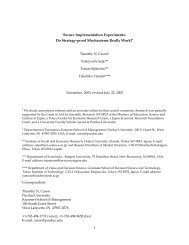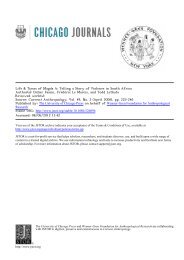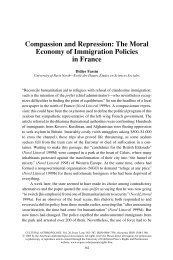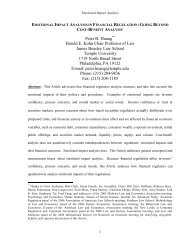Governance, Growth, and Development Decision-making - School of ...
Governance, Growth, and Development Decision-making - School of ...
Governance, Growth, and Development Decision-making - School of ...
You also want an ePaper? Increase the reach of your titles
YUMPU automatically turns print PDFs into web optimized ePapers that Google loves.
orders significantly exp<strong>and</strong> the size <strong>of</strong> societies. Hierarchies <strong>of</strong> elites<br />
build personal relationships that extend the control <strong>of</strong> the dominant<br />
coalition. Personal relationships in natural states result from traditional<br />
face-to-face interaction. In well-developed natural states, elite<br />
privileges include control over powerful social organizations, such<br />
as the church, governments, courts, <strong>and</strong> military units.<br />
The open access order builds on the organizational achievements<br />
<strong>of</strong> the natural state but extends citizenship to an ever-growing<br />
proportion <strong>of</strong> the population. All citizens are able to form<br />
economic, political, religious, or social organizations to pursue any<br />
number <strong>of</strong> functions. The only proscribed function is the use <strong>of</strong><br />
violence. Unlike the natural state, which actively manipulates the<br />
interests <strong>of</strong> elites <strong>and</strong> non-elites to ensure social order, the open access<br />
order allows individuals to pursue their own interests through<br />
organizations. Individuals continue to be motivated by economic<br />
rents in both political <strong>and</strong> economic markets, but the presence<br />
<strong>of</strong> open entry induces competition that tends to make such rents<br />
temporary. Social order is maintained through the interaction <strong>of</strong><br />
competition, institutions, <strong>and</strong> beliefs. Control <strong>of</strong> the military is<br />
concentrated in government, <strong>and</strong> control over the government is<br />
subject both to political competition <strong>and</strong> institutional constraints.<br />
Attempts to use the government to coerce citizens, either directly<br />
through the use <strong>of</strong> military force, or indirectly through the manipulation<br />
<strong>of</strong> economic interests (e.g., rent-creation), result in the<br />
activation <strong>of</strong> existing organizations or creation <strong>of</strong> new organizations<br />
to mobilize economic <strong>and</strong> social resources to bid for control <strong>of</strong> the<br />
political system. Maintaining open access is critical to sustaining<br />
the social order.<br />
Where limited access orders face constant adjustment to their<br />
political <strong>and</strong> social arrangements to accommodate changes in the<br />
interests <strong>of</strong> elites, open access orders face constant adjustment to<br />
their political <strong>and</strong> social arrangements to accommodate the rise <strong>of</strong><br />
new political <strong>and</strong> economic interests <strong>and</strong> the creative destruction <strong>of</strong><br />
old interests. Both social orders are stable as social orders, but not<br />
static in terms <strong>of</strong> short- <strong>and</strong> long-term fluctuations in economic <strong>and</strong><br />
Douglass North, John Wallis, <strong>and</strong> Barry Weingast 11
















